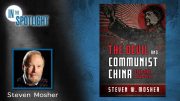
As it will be in the future, it was at the birth of Man There are only four things certain since Social Progress began. That the Dog returns to his Vomit and the Sow returns to her Mire, And the burnt Fool’s bandaged finger goes wabbling back to the Fire; And that after this is accomplished, and the brave new world begins When all men are paid for existing and no man must pay for his sins, As surely as Water will wet us, as surely as Fire will burn, The Gods of Copybook Headings with terror and slaughter return!
The above poem appeared in both the commercial for Glenn Beck’s newest book, The Overton Window, a political thriller, and resonates often throughout the novel as well. It fittingly describes how quickly mankind forgets the political past of its country and willingly allows bad history to repeat itself.
Funnily enough, when this commercial aired, the Left had a field day, mocking it and the poem Beck used, seemingly unaware that it was written by one of the most famous poets in history: Rudyard Kipling.
Beck’s The Overton Window is aptly named for a political technique used by the political elite. The Overton Window is the “way of describing what the public is currently ready to accept on any issue, so you can decide how best to move them toward what you want”.
The novel centers around the character of Noah, who works for a powerful public relations firm that works with the oligarchy of the United States. The firm controls what the public knows about their country’s progress, and continuously aids in the movement of the Overton Window towards the more radical extremes in a way that the public willingly accepts under the guise of say, emergency scenarios like “war” or the threat of “terrorism.”
Noah is a man who, despite his connections to the dangerous and evil PR firm, is on the fence. He has the potential to see the error of his ways and join the group of determined individuals who aim to save the country from the politicians and their progressive agendas that will ultimately take the United States to a new age of a one world government and one world economy. This group, the Founders’ Keepers, similar to our modern day Tea Party movement, led by Molly Ross, has grown wise to the true agenda of the politicians and works vigilantly to save the United States.
The Overton Window allows its readers to see what happens when the lines between patriots and terrorists is skewed, as can be seen today even. Strewn with actual quotes from our political leaders, past and present, including the memo entitled “Growing Threat of Domestic Terrorism” issued by the Missouri Information Analysis Center (MIAC), which over-generalized virtually anybody on the Right as a potentially dangerous militia member. The Overton Window provides its readers with a glimpse of what may come if Americans continue to sit by idly as their civil liberties are infringed upon.
In this political thriller, much of the police department has been corrupted by the governments’ interference, and can no longer be trusted. With the police engaged in rabble rousing and torture techniques, Americans have few trustworthy individuals to whom they can turn.
The government and the PR firm have the power to rewrite history, and do so regularly, in order to turn perception of hardworking Americans and fierce patriots into lunatic militia members.
Critics of the novel claim that most of the ideas expressed in The Overton Window are absurd, paranoid conspiracy theories. Yet much of what is written therein can even be seen today. In the same way that Tea Party members are depicted as violent racists — though an arrest has yet to be made at a Tea Party event, nor has any proof been provided of Tea Party racism (which is more than can be said at Leftist rallies or union gatherings) — the Founders’ Keepers are portrayed by the PR agency as dangerous, and the government uses the threat of danger to push a more radical police state.
Today, we see very similar scenarios in our country. The government has used Americans’ fear of terrorism to pass the Patriot Act and now considers taking control of the Internet, under the guise of cybersecurity.
It is not difficult to see that in the novel, the PR agency is mirrored after our mainstream media, as it manages to distort every despicable act of large, multinational corporations and the political elite to portray them in a positive light. Likewise, the character of Noah represents all independents who are aware that something is awry but cannot quite place their finger on the discomfort they feel, nor can they see how they can make any real change.
I believe the character of Danny Bailey, one of the more outspoken members of the Founders’ Keepers, is mirrored after Glenn Beck himself. Bailey has used blogs, and other less mainstream media outlets to put forth his message, which is often distorted to appear insane and potentially dangerous, though it is never his intention to promote violence.
The last 20 or so pages of the novel actually identify most of the areas throughout the text that are based on actual events, people, and language used by America’s politicians and other powerful individuals, including Edward Bernays, author of the 1928 book, Propaganda, and a member of Woodrow Wilson’s World War I propaganda agency — the Committee on Public Information. Bernays’ ideas on propaganda were so demented and powerful that his book was actually used by Hitler’s Joseph Goebbels.
The Overton Window is a heart-pounding thriller and can be read in two sittings if the proper amount of time is allotted for it. What’s most intriguing is the familiarity you will feel as you read it, noting similarities to news stories and quotes that you may recall.
Additionally, what makes the novel such a thriller is that for many, reading The Overton Window will feel like witnessing all of their worst nightmares come to life on the pages. Most of the novel is not far-fetched, and readers will learn how the Overton Window strategy has been used on Americans. You will feel bamboozled!
Beck is a great writer, and has a way with words. I’ve read several of his nonfiction books, and in doing so, have appreciated his sarcastic humor and clever poignancy, but The Overton Window is a new genre of writing for Beck, and readers will be pleasantly surprised to learn that his talents span even beyond what we have already seen.
But don’t take my word for it. Some people believe that you can judge a person by the friends that they keep. I believe that you can judge a person by his/her enemies. Take a look at who Beck’s enemies are and what they have said about his novel:
Simon Maloy of The Huffington Post writes: “Glenn Beck’s The Overton Window: A Conspiracy to Bore you Senseless”.
Maloy goes on to describe The Overton Window as Beck’s “very own fantasy land” where “all the conspiracies and apocalyptic rhetoric that clutter his chalkboards every night are proven to be entirely true”.
The LA Times described Beck’s novel as “incoherent and not at all thrilling.”
According to the Washington Post, “The danger of books like this is that radical readers may take the story’s fiction for fact, or interpret the fiction — which Beck encourages — as a reflection of a reality that they must fend off by any means necessary.” (It is my guess that the factual truth upon which most of the book is based is inconvenient for this reviewer).
Media Matters wrote, “As we slogged through its many plot holes, ridiculous narrative devices, and long-winded limited-government sermonizing passed off as a dialogue, we singled out ten moments that define The Overton Window as the truly and remarkably awful novel that it is.”
Obviously there is something about this book that the Left does not want the readers to be exposed to. If those reviews aren’t enough for you to realize how truly effective Beck’s novel must be, nothing is.
It must burn Beck’s enemies to learn that despite their best efforts, The Overton Window remains at the top of the New York Times bestseller list.
My advice? Make it a part of your own personal library today and once you’ve read it, circulate it amongst your friends that might be on the fence. This book has the power to tip their scales.
Photo of Glenn Beck: AP Images




